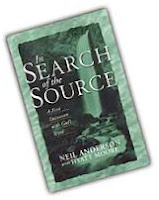TOTB Intro;
TOTB Part I;
TOTB Part II;
TOTB Part IIIOur bodies are stamped with the purpose of our existence - to give ourselves away in love. God teaches us that His love is faithful, fruitful, free and total. We were thus created to love, given God's example of what our love should look like and yet the tragedy of human love is that we love selfishly – we struggle constantly to reverse the effects of the fall – to reverse the effects of the continual ease of choosing only to use others and receive love. Love is truly meant to be a mutual gifting of self. We must find our way back... And if it hasn't been clear so far as to why Theology of the Body
is a perfect reflection for Lent, perhaps it will now become evident...Finding our way back to a true understanding of love was not a trivial task. The body, the material reflection of a wonderful spiritual union, in our fallenness was incomplete. Restoration was our only hope. And in many times, in many ways, steps toward regaining a true understanding of love were taken - Abraham received the promise that would God never reject his people; Moses brought the law, to provide order to a society that loved only selfishly; the judges sought to arbitrate the justice of God fairly; but the people wanted a god whom they could see, and they asked for a king. Through all these times, and through all these years, the heart of God, as expressed by the prophets, never changed: "Oh that they would be my people and I would be their God." Humanity's purpose was loving communion, first with God and then with one another. We were still so, so far away.
But God, the faithful lover, the total lover, perceived that in all of our attempts to reunite with our created purpose, we were groping, as in the night, never perceiving, not understanding the cost of what it would take to be reconciled to true life, to abundant life, to a life of selfless love. And, so, enters the most glorious story ever told.
In the fullness of time, God the Son became a
body. He became a whole person, just as we are, sharing in our humanity. God, in his body, became a new Adam. The old Adam had rejected his created purpose. The new Adam fulfilled his created purpose and, in so doing, provided a means whereby our bodies could be restored again to share in the abundance of their original intent. We had forgotten how to give ourselves away in love, but the new Adam, God in a body, reminded us. The new Adam lived only for God the Father and for us. He healed our diseases, he spoke comfort to the destitute, he loved the outcasts, he condemned injustice and, most wondrously, he provided a means for us to reengage the original intent of our lives. If the purpose of our lives was marred and clouded when the old Adam rejected his call to love in totality, the new Adam restored all that was lost by loving us completely and perfectly. The new Adam said that greater love had no man than to lay down his life. And the new Adam taught by example and thus laid down his life.
The old Adam's nature had so
propagated in humanity that we became selfish enough to kill our Eternal Lover. We hung the new Adam, Jesus the Christ, on a cross and watched him suffer, bleed and die. But our Eternal Lover, now in the bodily form of the new Adam said, "Father, forgive them, for they know not what they do." We did not know what we were doing - we took our only hope of abundant life, the person of God himself, and killed him, thinking that if we could rob him of his body, we could continue to grope in the darkness without facing the truth that our lives had no meaning apart from their created purpose.
But what we did not understand, what we could not comprehend was that love is, as the Song of Solomon proclaims, stronger than death. Perfect love cannot die. Herein there is still hope.
For God so loved the world,
God's love is faithful
That He gave
God's love is free
His only Son
God's love is total - He gave everything
That whosoever believes in Him
God's love is for all people
Will not perish, but have eternal life. (John 3:16)
God's love is fruitful - it brings forth new life.
 Our family has read lots of books together over the years. There are certainly some books that we can't wait to be done with, there are others that you wish would never end, and then there are the few and rare books that capture not only a moment and a story with drama and excitement, but also add insight to insight and prompt you to live life more richly. The Blue family gifted us with such a book at Christmas time: In Search of the Source.
Our family has read lots of books together over the years. There are certainly some books that we can't wait to be done with, there are others that you wish would never end, and then there are the few and rare books that capture not only a moment and a story with drama and excitement, but also add insight to insight and prompt you to live life more richly. The Blue family gifted us with such a book at Christmas time: In Search of the Source.









